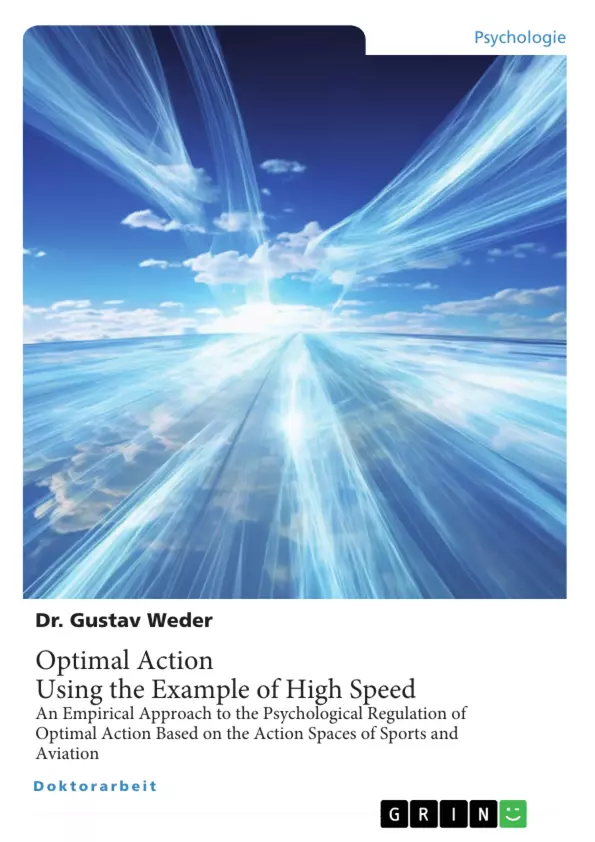Increased speed leads to a reduction of time available to a person for a particular action. This has the effect that the demands on the mental regulation of this action are increased and thus the person-environment-interaction is intensified.
This doctoral thesis deals with precisely this question of the optimal action using the example of high speed, which is discussed on the basis of practical experience reports from aviation and sport, reflected using theoretical approaches from various disciplines and presented in process models.
The topic is of interest both for the situations studied and for everyday situations. The author wants to encourage his readers to relate the empirical results to individual and collective issues in everyday economic or societal life that result in increased speed and thus stress.
Inhaltsverzeichnis (Table of Contents)
- Acknowledgements
- Introduction
- Basic research question
- Structure of the paper
- THEORY
- The person-environment-interaction in cognitive action theory
- Action space specific conception
- Representative action space
- Delimitation
- Intention to act
- Speed
- Expert knowledge
- Risk
- Structural differences
- Biomechanical settings
- Perceptual systems
- Control systems
- Feedback systems
- Personality-specific requirements
- Summary
- Cognitive psychological conception
- Perception
- Limiting function
- Perception and action
- Information selection
- Cognition
- Emotion
- Neurophysiological causes
- Psychophysiological consequences
- Motivation
- Consciousness
- Order threshold
- Attention and concentration
- Automation
- Altered consciousness
- Psychological view
- Physical view
- Psychophysical view
- Time
- Volition
- Personality
- Summary
- Action theoretical conception
- Dimensions of action
- Situation optimization
- Intentionality
- Organizational structure of action
- Process
- Regulatory systems
- Regulatory principles
- Internal representation
- Summary and outlook
- Summary
- Consequences for the study
- Specification of the research question
- METHOD
- Qualitative-empirical psychological research
- General considerations
- Philosophy of science paradigm
- On logic in the philosophy of science
- Importance of language and communication
- Accessing action-relevant internal representations
- Principles of the Grounded Theory conception
- The researcher as an instrument
- Samples of experts
- Experts as representatives of small samples
- Criteria for expert status
- Statistical information
- Research process
- Interconnectedness of data production and analysis
- Data production
- Qualitative interviews
- Interview preparation and implementation
- Problem area interviewer effect
- Anonymity
- Data analysis
- Procedure and instruments of the Grounded Theory concept
- Chronology of research phases
- Exploratory preliminary study
- First research phase in the sports action space
- Second research phase in the aviation action space
- Further analysis steps
- Quality criteria
- Considerations for qualitative-empirical research
- Problem areas of qualitative-empirical research
- Induction and deduction
- Sampling and representation problems
- Applied criteria
- Subject matter adequacy
- Transparency of the research process
- Method criticism
- Summary
- The influence of the action space on the psychological regulation of optimal action
- The role of perception, cognition, emotion, motivation, and consciousness in achieving optimal performance
- The development of a theoretical framework for understanding the process of optimal action
- The application of qualitative research methods, specifically grounded theory, in the investigation of psychological phenomena
- The identification of relevant factors and processes involved in the psychological regulation of optimal action in high-speed environments
Zielsetzung und Themenschwerpunkte (Objectives and Key Themes)
This dissertation investigates the psychological regulation of optimal action, specifically focusing on the examples of high-speed sports and aviation. The study employs an empirical approach based on the principles of grounded theory, aiming to understand how individuals in these demanding action spaces achieve and maintain optimal performance.
Zusammenfassung der Kapitel (Chapter Summaries)
The dissertation begins by outlining the basic research question and the structure of the paper. Chapter 2 delves into the theoretical framework, exploring the person-environment-interaction within cognitive action theory. It examines the specific characteristics of action spaces, such as speed, intentionality, and expert knowledge, and explores the role of perception, cognition, emotion, motivation, and consciousness in regulating optimal action. Chapter 3 presents the methodological approach, detailing the principles of qualitative-empirical psychological research and grounded theory. It discusses the selection of expert participants, the data collection methods, and the analysis procedures employed in the study.
Schlüsselwörter (Keywords)
The dissertation focuses on the following key themes and concepts: optimal action, action space, high-speed environments, psychological regulation, grounded theory, qualitative-empirical research, perception, cognition, emotion, motivation, consciousness, expertise, sports, aviation.
- Quote paper
- Dr. Gustav Weder (Author), 2002, Optimal Action. Using the Example of High Speed, Munich, GRIN Verlag, https://www.grin.com/document/1421666



